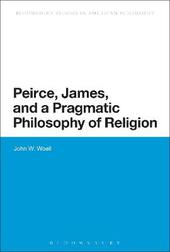
|
Peirce, James, and a Pragmatic Philosophy of Religion
Paperback / softback
Main Details
| Title |
Peirce, James, and a Pragmatic Philosophy of Religion
|
| Authors and Contributors |
By (author) Associate Professor John W. Woell
|
| Series | Bloomsbury Studies in American Philosophy |
|---|
| Physical Properties |
| Format:Paperback / softback | | Pages:224 | | Dimensions(mm): Height 234,Width 156 |
|
| Category/Genre | Philosophy of religion |
|---|
| ISBN/Barcode |
9781472524133
|
| Classifications | Dewey:210 |
|---|
| Audience | | Undergraduate | | Postgraduate, Research & Scholarly | |
|---|
|
Publishing Details |
| Publisher |
Bloomsbury Publishing PLC
|
| Imprint |
Bloomsbury Academic
|
| Publication Date |
21 November 2013 |
| Publication Country |
United Kingdom
|
Description
In this book, John W. Woell shows us how contemporary readings of American Pragmatism founded on mistakenly used categories of the Analytic tradition have led to misreadings of Peirce and James. By focusing on terms drawn largely from Descartes and Kant, contemporary debates between metaphysical realists, antirealists, Realists and Nonrealists, have, argues Woell, failed to shed great light on pragmatism in general and a pragmatic philosophy of religion in particular. Woell contends that paying close attention to the internal relationships among inquiry, belief, and their objects in the respective works of Peirce and James provides a means for fully appreciating pragmatism's richness as a resource for philosophy of religion. By taking account of a pragmatic point of view in philosophy of religion, this book incites a more productive discussion of the metaphysical status of religious objects and of the epistemic status of religious belief.
Author Biography
John W. Woell is Associate Provost at Albion College, USA.
ReviewsIn this important book, Woell carefully demonstrates whyinterpreting Peirce and James against the background supplied by contemporarydebates about realism is a serious mistake. Preoccupation with those debates isblocking the road to inquiry concerning the real nature and significance ofpragmatism. His painstaking analysis early in the book is designed to removethat obstacle, enabling him, in succeeding chapters, to offer a remarkablyfresh reading of these two thinkers. This book demands the attention of anyscholar who is interested in understanding pragmatism on its own terms, or indeveloping the prospects for a philosophy of religion articulated in a genuinelypragmatic idiom. -- Professor Michael L. Raposa, Department of Religion Studies, Lehigh University, USA
|